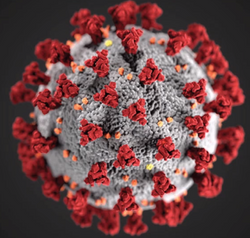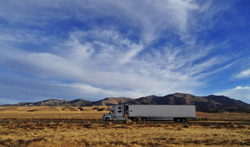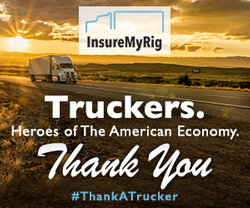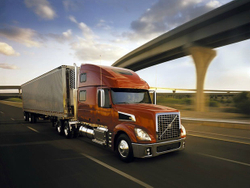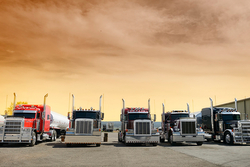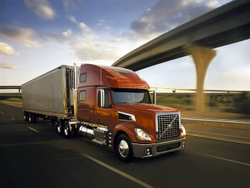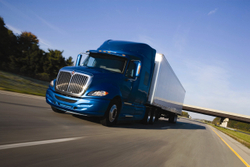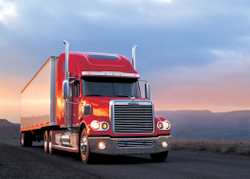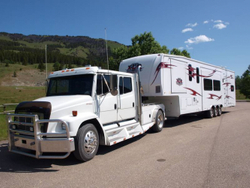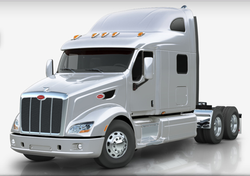Knowing the Difference
With Insure My Rig
Operating a trucking enterprise is a lot harder than most folks realize. At Insure My Rig, we know the difference. Here, we offer you insights, analysis and opinions on America's trucking industry.
With great power comes great responsibility. This is at least is true when you are navigating 40 tons of truck, trailer and freight at somewhere between 65 to 75 miles per hour on the Ohio Turnpike, eastbound and down through yet another lake-bred witches brew of snow, ice and bad winter drivers.
2020 in the blind spot
Year of our Lord 2020 is not quite in the rear-view mirror yet. Sure we got past it, but like some moron in your blind spot there’s plenty of potential to be rear-ended – and not know it’s coming. Participating in a political season unprecedented in U.S. history, trucking’s political voice and role in the country’s economy has been clearing and getting louder. Or softer as the case may be, as political tides were turning in Ohio January 17.
According to coverage by local NBC affiliate WCMH outside the statehouse wearing a t-shirt with “Dancing for Peace” on one side and “The Dancing Trucker” on the other. According to the report it was John Drury, who they described as “a trucker who loves to dance.” They caught up to him as he “vibed in front of the cenotaph” whatever that means, in fluorescent orange and yellow shoes, pink socks and shorts, jamming to the music playing in his headphones.
moreThe country’s COVID fatigue is beginning to show as we enter the ninth month of media-fueled fear, lockdowns, curfews and serious attempts to shut down Thanksgiving. Although there might be a few turkeys out there happy for a reprieve this season, the attempt to disrupt the beloved family holiday to “keep people safe” has not been well received. Like the Toms dropped out of a helicopter in that famous scene from WKRP in Cincinnati this turkey may be flying, but not for long. Oh! The humanity!
Good news from an unprecedented effort
While the country awaits the certifiable returns of the election, riveting results have started coming in from the President’s $10 billion vaccine creation initiative, Operation Warp Speed. The two top vaccine candidates Moderna and Pfizer, both reported superior efficacy rates ~95% in late stage clinical trials. Approval will likely follow very soon.
Both Pfizer and Moderna use the same genetically engineered vaccine approach, which involves RNA molecules. Assuming FDA authorizes the vaccines for “emergency use,” the companies will ramp up production and distribution of hundreds of millions of doses as fast as they can. These vaccines will not deliver themselves; enter America’s truckers.
moreWhen Daimler, Toyota, GM and Hyundai all announce in about the space of six to eight weeks that they are hitting the gas on plans to introduce hydrogen-fueled Class 8 and similar commercial vehicles, you’ve got to believe it’s more than hot air.
The first week of September General Motors announced it was taking an 11% stake in Nikola. As part of the deal, GM says it will help Nikola engineer and manufacture its battery-electric and hydrogen fuel cell vehicles, including the Badger pickup truck.
The deal calls for the exchange $2 billion in newly issued common stock for the in-kind services and access to General Motors’ global safety-tested and validated parts and components.
GM hydrogen cells for Nikola’s dream
According to Verge.com, GM will supply hydrogen fuel cells to Nikola for its Class 7 and Class 8 trucks. Meanwhile, Nikola remains an independent company and will be responsible for the sales and marketing of the nifty Badger, the company’s pick-up truck. Verge reports GM is in the midst of a $20 billion pivot to an all-electric future that features $2.2 billion in spending to retrofit the company’s fully-dedicated electric vehicle assembly plant.
moreIn the wake of pandemic, it looks like the FMCSA’s new Hours of Service (HoS) rules are just about to kick in for most of the nation’s 3.5 million drivers. Not surprisingly, some folks are still not satisfied that the mandates will do nothing except make driving a truck commercially less safe.
Entering the pandemic curve too fast, the load, er, HoS rules began shifting. To avoid a roll-over, the FMCSA announced that it was temporarily lifting HoS regulations for operators transporting emergency and relief supplies in response to the panic.
Many pointed out this wasn’t the first time HoS rules were lifted in response to natural disasters and other emergencies, but it is the first time in history that HoS regulations were suspended on a national scale.
FMCSA explained the move was intended to provide relief to areas experiencing shortages due to the pandemic. For most of the summer truck drivers were no longer directed to stop driving after 11 consecutive hours during a 14-hour day. In other words, if they were hauling something essential, they could keep on truckin’.
Teamster’s aren’t happy about
Just as new HoS regulations were about to go into effect the end of September, a coalition of three safety group including the International Brotherhood of Teamsters, were asking a federal court to overturn the new regulations.
moreGreed disguised as virtue is ugly. What’s even uglier is congress’ persistent, punitive crusade against trucking in the guise of environmental justice and public safety.
On July 1st, the environmental crusaders of the Democrat-controlled House passed the $1.5 trillion Moving Forward Act, a mega infrastructure spending bill designed to inject some “Green New Deal” thinking from party favorites and to fund their ideology based on the “settled science” of climate change.
Yet, they still persist
The Moving Forward Act says a recent National Law Review, op-ed is a manifestation of House Democrats’ vision to “simultaneously revitalize and decarbonize U.S. infrastructure across all sectors of the economy, consistent with goals to achieve a net-zero emission economy by 2050.”
What caught the trucking industry’s attention the most was the provision to hike truckers’ insurance coverage from $750,000 to $2 million. Tantamount to a hidden tax on truck fleets and operators, “This language was written by trial lawyers, supported by trial lawyers and, to no surprise, benefits trial lawyers,” snarked ATA Executive Vice President for Advocacy Bill Sullivan to FreightWaves.
moreWill there be a time when the commercial blogosphere won’t have to lead their content with some mention of COVID-19 and the affects of the pandemic? Likely not for the while, but the crisis has been putting trucker safety and safety technology into a new light.
Truck safety is especially relevant considering the times and how confrontational the regulatory and legal system has been against drivers, resulting in what are now termed “Nuclear” verdicts because the excessive damage awards can obliterate a company financially.
It also has everything to do with obtaining cheaper trucking insurance rates. Before COVID-19 (remember that?) the industry was being rocked by closing after closing, including the failures of some of the biggest—most of those blamed rising insurance rates as a root cause.
David Braunstein’s TSR
President of Together for Safer Roads or TSR, David Braunstein says his organization’s mission is helping improve road safety and save lives through roads-supported local demonstration projects, key partnerships and key connections with the international road safety community.
In a recent editorial in FreightWaves, Braunstein says truck drivers have always kept America’s economy moving, handling about 80% of all cargo in the U.S is transported by trucks. He notes the trucking industry itself is responsible for roughly 6% of all full-time jobs in the country – which adds up to some 3.5 million professional truck drivers on the roads. “Without truckers,” says Braunstein, “the American economy would grind to a halt.” True that, eh?
moreHopefully, everyone in the trucking industry will soon be putting the COVID-19 panic in the rear view mirror. Just before Memorial Day, more and more states were implementing phased re-openings and allowing citizens access to their constitutionally guaranteed rights to assemble and move freely.
Essential to remember the sacrifice
As those less essential flocked to the lake, the shore or wherever people go to celebrate Memorial Day, hopefully some of America’s most essential, our truck drivers, will be able to finally take a break as well. Let us all pause to remember those who’ve sacrificed everything to secure the freedoms we all hold so essential.
Next normal coming
The pandemic has proven to be a belligerent, monster disruptor of consumer and industrial supply chains. Trucking’s role keeping goods, materials and the economy rolling was nothing short of phenomenal and will certainly play a role in re-establishing “normal” supply lines depleted by hoarding housewives and profiteering resellers.
However, the damage is still being assessed and the carnage it’s causing in the industry is not likely to abate soon. According to Ron Sterk in Food Business News, for all modes, logistics have been at center of disruption caused by the coronavirus (COVID-19) 2020.
moreTaking it to a higher power, President Donald Trump offered truckers high praise and the thanks of a grateful nation. “Thank God for truckers,” he said during an April 16 White House event intended to honor the men and women who continue to work the roads despite the risk, and who have been (literally) carrying the nation’s economy since the COVID-19 crisis alarmed officials enough to shut most of it by April.
President Trump, offering his remarks from the White House lawn, was flanked by two trucks and four proud commercial drivers. It also wasn’t the first time he’s thanked truckers for their efforts or invited them to the White House. In his manner, his praise was effusive: “American truckers are the foot soldiers who are really carrying us to victory,” Trump said. “They’ve done an incredible job. We’ve had no problems. It’s been just — it’s been just great.”
Good timing for the industry
Covering the event, Transport Topics reported Trump’s remarks were delivered shortly before he was scheduled to meet with governors on a federal economic road map he intends to recommend for reopening society. Great timing by the negotiator-in-chief, because it’s precisely those folks who need to hear this message most – and as loudly and clearly as possible.
moreThe world turns in interesting ways and often spins in a direction that surprises even the most savvy and cynical social observers. Such is the case with COVID-19 the virus shipped special delivery from Wuhan China.
We turned a really sharp corner
Like many flu viruses making their way around the population centers of the world, COVID-19 began to spread – and by January was making some very scary headlines. As the news of mounting cases, rising death tolls and overtaxed healthcare systems, the virus mutated into more of an agent of fear rather than disease. Civilized society and culture took a sharp turn and within the span of about two weeks decided to see if it could stop the virus from spreading by stopping the world from turning.
Because of an unprecedented response by the most of the world’s industrialized countries to try and halt the disease’s spread we now find ourselves sheltering in place and keeping our social distance. To get the job done the best course of action was to begin closing schools and churches, shuttering public events, stopping travel, cancelling industry conferences, axing arena sports and more.
All of that has put the US economy into a real skid and the stock market’s gyrations have been epic and historic. According some sources, we’re already in recession. Fortunately, like any disease the US economy has some built in anti-bodies that will see us through to better economic health once the crisis passes. Which it will.
moreAs trucking’s drivers work the roads this winter, things can get a bit chilly in the cab. But as everyone knows, nothing warms trucker’s and fleet owner’s souls better this time of year than a little tech-talk about trucks. What’s hot in truck technology these days? A lot of cool stuff. As usual it’s the sexy stuff we all enjoy in this business: efficiency, safety and comfort.
Electric light and power
Analysts at ResearchandMarkets find falling battery prices, broader incentive policies, and charging infrastructure developments will boost electrification of fleet trucking.
They project battery pack prices are expected to fall below $100 per kWh by 2023, with high battery production capacities of 250+ GWh globally. The trend’s wave is just beginning to break but the tsunami of electro-motive power is coming: “With growing battery availability and technology-readiness, fully electric vehicles will gain prominence and will be largely used across all regions by 2025,” Explains ResearchandMarkets. “OEMs, they note, “have also announced plans to manufacture electric trucks and range-extended powertrain.” Meanwhile, perennial favorite, fuel cell technology, will gain prominence after 2022 explains ResearchandMarkets “due to the advantages of reduced component weight and packaging size.”
moreOne of the things that effectively stopped the nuclear arms race between the United States and the Soviet Union was the real politic of Mutually Assured Destruction, appropriately, “MAD” in acronym.
This Cold War concept was pretty simple and unassailable, one that even the densest of ideologues on either side could fathom: You pull your trigger, we’ll pull ours and we’ll all go down in the flames of global Armageddon.
Trucking’s Cold War
Similar politics seem to be at work in trucking and the Cold War between society and the industry is heating up; shots have been fired as they say.
The reason, according to trucking executives and transportation attorneys interviewed by Logistic Management’s, John D. Schulz, is the rise of so-called “nuclear” settlements either awarded by juries or negotiated by attorneys in a recent spate of wrongful-death lawsuits against trucking firms and their drivers.
According to Schulz, the common definition of a “nuclear settlement” is about $10 million. That might be the median but in reality, jury awards to plaintiffs in recent wrongful death suits involving truck- related fatalities has approached $20 million in some high-profile cases.
moreCapturing the title “Largest trucking-sector bankruptcy ever,” Celadon abruptly shut down, announcing it was seeking Chapter 11 relief December 9. The bankruptcy meant a huge lump of coal in the stockings of more than 3,000 employees, most of them drivers. Many of these drivers were stranded with their rigs across the U.S., Canada and Mexico and likely jobless for the holidays. Merry Christmas.
Celadon is one of the largest truckload carriers in North America, with some 3,300 trucks and 3,800 employees, including approximately 2,500 truck drivers. According to transportation research company SJ Consulting Group Inc., the Indianapolis-based company earned an estimated $611 million in revenue in 2019.
For many the obvious call was Caledon had succumbed to economic forces resulting from overcapacity and climbing operating costs. This may be true, but the death-knell started tolling when local prosecutors revealed the company’s accounting scandal that they say will cost shareholders upwards to $60 million.
Trucking’s year of living dangerously
Embezzled out of tens of millions of dollars, many agree the scandal was at the very least the final blow, Caledon’s knock-out punch coming after being jabbed by a succession of recessionary business cycles impacting the trucking industry. But analysts argue that it had more to do with company business strategies gone wrong and poor organizational cohesiveness that hampered efficient operations and an environment where corruption of this scale could be sustained for so long.
moreAvery Vise VP, Trucking for FTR Transport Intelligence recently gave his firm’s outlook for the trucking and freight economy at the recent Motor Carrier Insurance Education Foundation (MCIEF) Annual Conference held in October.
Rear-view mirror shows industry slow to respond
According to Vise, manufacturing surged starting in late 2016, the trend peaking in the summer of 2018. He also explained to attendees that retail sales were surging, and construction was strong.
Unfortunately, Vise explained carriers were slow to respond having not added the capacity needed to handle this demand. Citing uncertainties over the Trump administration’s policy on electronic logging devices (ELDs) Vise noted that probably played a role in holding back a more robust response. Vise and FTR surmise that ELDs significantly hit productivity, especially among small carriers.
FTR’s analysis: Even with more trucks and drivers and slower freight growth, overall capacity and demand are closely balanced.
Major HoS violations down year by year
Between 2016 and 2019 the number of Part 395 HoS violations has steadily decreased. For example form and manner violations were down 52 percent, 30-minute break down 60 percent, false log 25 percent, 14-hour violations down 50 percent and 11-hour violations down 42 percent.
moreNow that electronic logging device (ELD) mandates are reality it’s the device’s and the law’s duty to ensure drivers comply with other rules that monitor and to a certain extent, control their behavior to proscribed norms.
Although the “big brother” aspect of ELDs are indisputable and driver’s privacy concerns are well founded, the technology may actually be helping rather than hindering driver’s time behind the wheel.
Where’s my pencil? I need to write this down
Electronically enabled monitoring and data logging generally relieves drivers of tedious logging and record-keeping (the paperwork) and automating many of those administrative and wrote logging tasks that most drivers on the road right now are now old enough to remember they learned to hate.
The technology facilitates considerably more accurate recording of all driver activity by providing periodic snapshots of the vehicle’s location throughout the driver’s day (mandated by HoS). ELDs automate the recording of a variety of metrics including:
Hours of service
Geographic location/GPS
Engine hours, operating time, fuel consumption, motion
more
On August 14, the Federal Motor Carrier Safety Administration (FMCSA) issued to the trucking industry a Notice of Proposed Rulemaking for Hours of Service (HoS). According to a local news outlet, the FMCSA”s 129-page proposal, provides more options for drivers while maintaining safety standards.
In early July, the Associated Press reported that the DOT’s truck regulating agency was taking steps to “relax” the current HOS rules, which many view positively as good example of the Trump administration’s de-regulation efforts, which are viewed favorably by most commercial business interests, if not safety interests.
Trying to get it right, listening to truckers
According to a report in Logistics Management, FMCSA officials claim their proposal won’t increase driving time and would continue to prevent CMV operators without at least a 30-minute change in duty status. Officials say the proposed rule is estimated to provide $274 million in savings for the United States economy and its consumers. The proposal was opened for 45-day notice of proposed rulemaking (NPRM) comment period before going into effect.
Current HoS regulations permit long-haul drivers up to 11 hours of driving time at the wheel each day. No matter how much time is spent driving, the operators must end their day after 14 hours. The regulations also point out drivers must log 10 consecutive off-duty hours before starting a new day.
moreRemember when citizen-band (CB) radios emigrated from trucker’s cabs to America’s hearts? Can you hear the strains of CW McCall’s “Convoy” as it climbed to number one in 1975?
For nostalgia’s sake here’s the opening to that classic:
“Was the dark of the moon on the sixth of June
In a Kenworth pullin' logs
Cab-over Pete with a reefer on
And a Jimmy haulin' hogs
We is headin' for bear on I-one-oh
'Bout a mile outta Shaky Town
I says, "Pig Pen, this here's the Rubber Duck.
"And I'm about to put the hammer down."
Before digital disruption or whatever epoch of the industrial age we are in, and before access to cheap solid-state radios, truckers didn’t really have many channels with which to communicate independently and interact among each other while operating their rigs. It was isolating. But access to cheap solid state radios which permitted access to CB radio frequencies launched a cultural phenomenon in the late ‘60s and through the ‘70s.
A cultural alignment like few others
Recall that CB radios became popular as the heavy-handed state reduced speed limits on the pretext to save the environment and raise fuel prices (this is SO rich) help the US reach energy independence from dreaded OPEC after the oil crisis.
moreNo one enjoys hearing the news that a family-run trucking company is parking its rigs for good. The headline in June was harsh, slightly sensational, but plainly factual: “Indiana trucking company to shut down after insurance costs double, rates fall.”
Thinking about what one might say to the press and employees on camera about why your business was all of a sudden failing, one might be tempted to blame a couple very familiar bogeymen like Big government and uncaring insurance companies.
It’s sort of like what Shakespeare said in one of his plays: “First, let’s kill all the lawyers.” Even way back when, there was enough general loathing for the predations of the profession in general society that a clever wag could toss out that bit of populist red meat and without doubt, the audience and everyone is in on the laugh.
Reported in FreightWaves by Ashley Coker, the owner of Anderson, Indiana based A.L.A. Trucking, Inc. Alan Adams lamented that because of the way the Federal Motor Carrier Safety Administration (FMCSA) handles Compliance, Safety, Accountability (CSA) scores, the companies commercial trucking insurance rates essentially doubled to more than $700,000 in 2019 compared to less than $340,000 in 2018.
moreA cat without a tail is known as a “bobtail.” You may know one. Semi-tractor trucks without their trailers are also known as bobtails. You also may know one. After that, at least in trucking, the use of “Bobtail” by the industry becomes a little murky. For instance, straight short-haul box trucks are being called bobtails now too. So are those “bobtailing” operators driving the packaged goods economy.
But that’s just a digression. To most owner operators working under contract with large shippers “bobtail” refers not so much to the truck but the absence of a load and a trailer to tow it with.
Bobtails and bobtailers
Bobtailing in the vernacular of owner operator truckers, refers to the act of driving a tractor without a trailer—a term they interchange with deadheading, because there is no load involved. Most class 8 and class 7 owner operators are familiar with the concept because they often must transit from one dispatch to another with no trailer and no load.
Their truck is also bobtailing when the driver is headed home or back to base.
Even if their tails are short, bobtailers’ need to watch ‘em
moreLike Tiger Woods at the Master’s this year, hydrogen fuel-cell power for trucks is back baby! Also like Tiger, hydrogen fuel cells for powering commercial vehicles have been a celebrity on the emissions-free vehicle links for decades now, minus the messy divorce, and whole nine-iron in the back window thing of course.
Ready to deliver the power of water to fuel trucking’s next wave of emission’s-free motive power, Nikola extolled the benefits of two new designs, the Nikola Tre (for Europe only) and the Nikola 2 just before Easter. For hydrogen fuel-cell powered semi’s it truly is a comeback of sorts, but unlike Tiger, the technology never actually made it to the Masters as a prominent competitor.
Hydrogen fuel cells to make electricity is one of those “Future is now!” technologies that has been on the periphery of industrial and commercial application for years. Sure, piloted it here, demonstrated there, the tech is on a solid foundation, but it just did not catch on – mostly because of the infrastructure required to supply hydrogen fuel reliably, sustainably and geographically to over-the-road vehicles.
According to the founder of Arizona startup Nikola Motor, CEO Trevor Milton, says the problem isn’t the technology; and for a variety of reasons it makes a much better choice for trucks than batteries. Why? Because batteries boys and girls; very HEAVEY batteries.
moreIs the U.S. labor market for truck drivers broken? Well, the answer to that depends on who you ask lately. If you ask Stephen Burks, a professor in the Department of Economics at the University of Minnesota Morris, or his bureaucratic research acolyte Kristen Monaco with the Bureau of Labor Statistics (BLS), they don’t really think it is, even though their new study posits the question as the title of their latest work.
Basically, after a deep dive into a big pool of labor statistics data, they conclude that while the market is tight for long-distance drivers, turnover is not a big deal and that all the trucking industry has to do to attract more drivers is bump up pay a bit, and like most labor markets in the blue collar category, that will provide the wage incentives to fill any gaps.
moreIf you live in the Great Lakes region of the country, right about this time of year things tend to get a bit dreary. It’s cold, it’s gray, and the weathered slush piles are eroded just enough to see all the trash. For everything, and everybody west of the Appalachians, New York, Pennsylvania, on through Ohio, Indiana, Illinois and on up by Wisconsin, Michigan and Minnesota way, it is really is a lovely time of year, perhaps even rivaling mud season in Colorado.
moreRegarding driver retention, if there was business management lecture series for fleet operations managers titled “How to read driver’s damn minds,” it would likely be standing room only. Fortunately, or unfortunately there’s an app for that, and it’s being brought to you by the entrepreneurs at Work Hound, whose stated mission is “helping people love the work they do.” Wow, that’s a fantastic sentiment.
moreTechnology of all kinds integrating its way into the cockpits of commercial fleet trucks and the impact is now being felt among fleets and drivers across the logistics landscape. From ELDs to engine monitoring, the integration of cloud-based, wireless networked digital technologies and sensing devices is bringing “Industry 4.0” principals to trucking; the “digital disruption” that everybody in the commercial economy is talking about.
moreWant to thank your truck drivers for all their service during the holiday season? Find him or her a parking spot. Seriously.
Of all the issues, truck parking ranked second by drivers in the recent American Trucking Research Institute’s (ATRI’s) annual study of the Top 10 Driver and Carrier Issues, concerns about Hours of Service (HoS) mandates ranked, not surprisingly number one.
Carriers, on the other hand, ranked driver shortage number one, placing driver retention in the number-two slot.
ATRI announced the results of its annual survey the end of October at the 2018 American Trucking Associations’ Management Conference and Exhibition in Austin, Texas. Survey results were tabulated from more than 1,500 responses from motor carriers and commercial drivers.
moreThe National Highway Traffic Safety Administration (NHTSA) recently announced that 2017 highway fatality numbers dropped 1.8% following two consecutive years of large increases. That is good news, but the bad news is that even though preliminary estimates for the first six months of 2018 appear to show that this downward trend is continuing, fatal crashes involving heavy-duty trucks were up 9% in 2017 compared with 2016.
moreIf there ever was a time to publicly thank the truckers in your life, National Truck Driver Appreciation Week might be a great opportunity. Designating the first full week after Labor Day to celebrate our country's toughest laborers, America's professional truck drivers, The American Trucking Associations (ATA) started the party September 10. The entire week, said ATA, is set aside to honor the country's ~3.5 million truck drivers, those everyday heroes that safely and professionally deliver everything that is making America great right now.
Defining what National Truck Driver Appreciation Week, is all about, ATA President and CEO Chris Spear wants the national media and everyone living in the U.S. to know that "Truck drivers are an integral part of the nation's growing economy and deserve to be celebrated by their companies, customers, neighbors, families and friends."
These Drivers Improve Our Quality of Life
Everything that we consume says Spear, from food and clothing to shelter and medicine, is delivered by a truck driver and there is simply no disputing their immense impact on our daily existence: “These drivers improve our quality of life by dedicating themselves to safety and making every effort to deliver the things we need efficiently, professionally and responsibly.” Amen, brother.
moreRecreational vehicles have been with us for a long time. It’s a mature industry that has seen its share of cycles; boom and bust. Right now the RV industry is in a tremendous growth cycle and it is pushing a new and significant trend across the commercial transport and shipping landscape. But don’t think it’s just Grandma and Grandpa spending their pensions on one last shot of freedom.
Here come Justin and Jessica
For those of us pushing past 50 the stereotype of Bill and Barbara driving the Winnebago down to Clearwater from Indianapolis after Christmas is forever etched in our minds; especially having spent so much time behind them heading south into Chattanooga.
Chances are the folks you see rolling out of a shiny new Sprinter conversion to fuel up or kicking the tires on a spiffy new Airstream at the rest stop are decidedly NOT Bill in Barb; more like Justin and Jessica. Along with hundreds of thousands of other millennials shedding house-filling materialism for experiences on the open road. Justin and Jessica don’t have a ton of coin, but they are spending a bunch of it on a little slice of heaven they can haul to whatever amazing destination they have in mind.
moreIt wasn’t all too long ago that among the persona non grata eschewed by the beltway glitterati were truckers (drivers) and their dirty, smelly big intimidating and dangerous trucks. Ask the EPA, DOT SEC, IRA, FMCSA or any other agency concerned with U.S. commerce, trucks hauling freight on their roads was a necessary evil, to be tolerated, but only after reigning in their social and environmental transgressions with comprehensive regulation.
It wasn’t so long ago that trucking came to dominate the freight industry in the latter portion of the 20th Century -- achieving national attention during the ‘60s and ‘70s. Remember the CB craze? Thank a trucker. Remember when the charts were topped with songs and movies about truckers? Anybody remember the song and movie Convoy? How about Sally Field and Burt Reynolds in Smokey and the Bandit? That truck based Hollywood vehicle drove everyone to the movies. Trucking was American, trucking was sexy, drivers’ were the warriors and at times, heroes of the road.
Popular culture complimented the industry but it wasn’t all Coors east of the Mississippi, three part harmonies, and driving into the sunset; the rising cost of fuel during the energy crises of 1973 and 1979 roiled the industry mightily, prompting strikes and other conflicts across the U.S. In a burst of conservative, free market economic theory, Congress acted and the industry was drastically deregulated by the Motor Carrier Act of 1980.
moreTwo months since the inception of the ELD mandate and already legislators are looking to change settled law. Ah well, nothing new in the land of (to paraphrase the house minority leader) “you’ve got to pass it before you can know what’s in it” lawmaking – or something to that effect. Recent headlines focus on the relief being sought by congress people for two groups within trucking suffering some indigestion from ELD implementation: livestock haulers and owner-operators.
It’s Been Churning for a Long Time
It’s not like proponents and opponents of current law didn’t have enough time to sort it out before now. An analyst for GPSTrackit offers its web viewers a quick trip down memory lane citing that by the mid-1980s, motor carriers had begun implementing relatively functional ELDs (AOBRDS) to record HoS for drivers. However this was early in the devices technical development and downloading data was challenging because of telemetry issues transmitting data among others.
Then came the Insurance Institute for Highway Safety (IIHS) which lobbied the Department of Transportation for a mandate that would require motor carriers to use ELDs. This was in 1986 and marks the first political action pushing for electronic monitoring of drivers.
moreAt just a little over a month out from the April 1, 2018 start of the Electronic Logging Device (ELD) mandate and the sense out there on the trucking industry’s prairie seems to be that of an unsettled peace, as the various players turn inward to try and figure out how to satisfy the “man,” live the American dream and keep just a little more pay in their pockets in the face of ELD-era regulation.
To truck owners and fleet operators America’s roads are analogous to the fields of opportunity that John Steinbeck used as the setting for his characters in his iconic novella Of Mice and Men. The title is taken from Robert Burns' poem "To a Mouse", and offers this Shakespeare-worthy word of caution regarding the human condition: "The best laid schemes o' mice an' men / Gang aft agley." (For non-18th century Scotts: “The best laid schemes of mice and men / Often go awry.”)
To the federal government, ELDs are indeed a “best-laid” scheme. By design. What’s not to LOVE? Awesome application of trouble-free modern (relatively) cheap technology, no paper records, unambiguous HOS data and much, much more! You know, this and $350.00 are sure to help you “Buy the Farm” for your fleet or the truck you own and operate … eventually.
moreA new energy is going to be required to recruit and retain truck drivers and the industry is agitating for some fresh ideas to get more “butts” in the driver’s seat of America’s trucks. American Transportation Research Institute (ATRI) statistics projected in 2015 that it would take hiring almost a million drivers over the coming decade just to maintain the existing labor force.
Although officially known as the “Driver Shortage” the issue has been a chronic PITA for the industry for decades. The sources of this malaise are as numerous as they are challenging to overcome, but for the most part, stem from the rapidly aging demographics of the current population of drivers who are leaving the industry, and the inability of said industry to attract and retain new drivers and bring them into the profession at a rate faster than attrition.
Demographically one of the largest groups to offer a potential pool of new talent are people from 18 to 25 years of age; a truck driver has to be 21 to obtain a CDL for interstate commerce, which naturally prevents those younger than 21 from entering the industry’s workforce--something that is effectively shutting down a path for new drivers to enter the profession.
more

